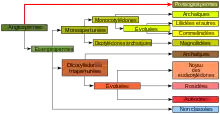Nymphaeales
L'ordre des Nymphéales (Nymphaeales) regroupe des plantes angiospermes basales par rapport aux autres angiospermes. Basal veut dire que les Nymphaeales sont à la base de l'arbre phylogénétique des Angiospermes, raison pour laquelle elles appartiennent au groupe des Protoangiospermes.
Histoire du taxon
En classification classique de Cronquist (1981)[1] il comprend cinq familles :
- Nelumbonacées (Nelumbonaceae)
- Barclayacées (Barclayaceae)
- Cabombacées (Cabombaceae)
- Cératophyllacées (Ceratophyllaceae)
- Nymphéacées (Nymphaeaceae) (famille des nénuphars)
Dans la classification phylogénétique APG II (2003)[2], il n’existe pas, mais le Angiosperm Phylogeny Website a réintroduit cet ordre.
Selon la classification phylogénétique APG III (2009)[3] et la classification phylogénétique APG IV (2016)[4], cet ordre comprend trois familles :
- ordre Nymphaeales
- famille Cabombaceae
- famille Hydatellaceae
- famille Nymphaeaceae
Références
- (en) Arthur Cronquist, An Integrated System of Classification of Flowering Plants, New York, Columbia University Press, (ISBN 0-231-03880-1, OCLC 1136076363, lire en ligne)
- (en) Angiosperm Phylogeny Group, « An update of the Angiosperm Phylogeny Group classification for the orders and families of flowering plants: APG II », Botanical Journal of the Linnean Society, Wiley-Blackwell, Linnean Society of London et OUP, vol. 141, no 4, , p. 399–436 (ISSN 0024-4074 et 1095-8339, DOI 10.1046/J.1095-8339.2003.T01-1-00158.X)
- (en) Angiosperm Phylogeny Group, « An update of the Angiosperm Phylogeny Group classification for the orders and families of flowering plants: APG III », Botanical Journal of the Linnean Society, Wiley-Blackwell, Linnean Society of London et OUP, vol. 161, no 2, , p. 105–121 (ISSN 0024-4074 et 1095-8339, DOI 10.1111/J.1095-8339.2009.00996.X)
- (en) Angiosperm Phylogeny Group, « An update of the Angiosperm Phylogeny Group classification for the orders and families of flowering plants: APG IV », Botanical Journal of the Linnean Society, Wiley-Blackwell, Linnean Society of London et OUP, vol. 181, no 1, , p. 1-20 (ISSN 0024-4074 et 1095-8339, DOI 10.1111/BOJ.12385)
Voir aussi
Bibliographie
- Marc Juguet, « Origine et étapes de la monocotylie chez les Monocotylédones. III—L'embryon des Nymphaeaceae: une forme intermédiaire entre Dicotylédones et Monocotylédones », Acta Botanica Gallica, vol. 147, no 2, , p. 173-198 (DOI 10.1080/12538078.2000.10515408, lire en ligne)
Article connexe
Liens externes
- (en) Référence Angiosperm Phylogeny Website : Nymphaeales
- (fr+en) Référence ITIS : Nymphaeales
- (en) Référence NCBI : Nymphaeales (taxons inclus)
- [PDF] Magnoliidae, p.14-16
Cet article est issu de wikipedia. Text licence: CC BY-SA 4.0, Des conditions supplémentaires peuvent s’appliquer aux fichiers multimédias.

